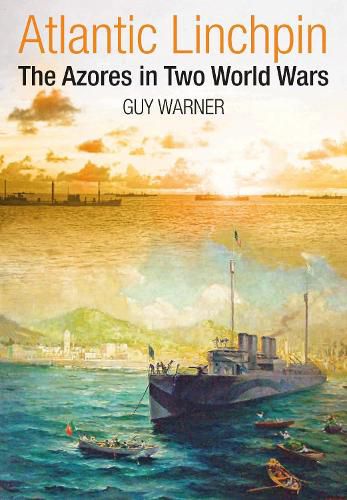Readings Newsletter
Become a Readings Member to make your shopping experience even easier.
Sign in or sign up for free!
You’re not far away from qualifying for FREE standard shipping within Australia
You’ve qualified for FREE standard shipping within Australia
The cart is loading…






On a map the Azores appear as nine tiny specks in the middle of the Atlantic Ocean, but their location was to prove strategically vital in two world wars The Atlantic became a crucial battleground twice within the space of 25 years, as the US ‘arsenal of democracy’ sent firstly stores, arms and equipment, followed by many thousands of troops to fight in Europe. In both desperate and closely fought struggles at sea, Germany sought to stem the flow and thereby win the war, by cutting this vital lifeline, using a new weapon
the ocean-going submarine. In the First World War the Azores became a mid-Atlantic refuelling location, a base for US and Portuguese naval vessels and
in a hugely innovative contribution to the anti-submarine war
for the patrol seaplanes and flying boats of the US Marine Corps. Portugal was neutral during the Second World War but when Winston Churchill invoked a treaty dating from 1373, permission was given in 1943 for an RAF Coastal Command base to be very rapidly established at Lagens. From there convoys could be protected and U-boats could be harried and sunk, so closing the notorious mid-Atlantic gap. Later, it also became an important staging post for US aircraft, as it had been in the previous conflict. The significance of the Azores has been overlooked in most military histories, but this extensively researched and copiously illustrated book from historian Guy Warner provides a detailed but balanced appraisal. The author has had access to archives and photographic collections in the UK, USA, Portugal and the Azores, consulting with local historians to produce a book that sheds much new light on a hitherto under-appreciated facet of twentieth-century history. AUTHOR: Guy Warner is a retired schoolteacher and former MOD civil servant, who has written more than 30 publications on aviation, military and naval history, four of which have been published by Pen & Sword, as well as several hundred articles for magazines in the UK, Ireland, France, Italy, Portugal, Canada and the USA. He also gives talks on these topics, reviews books, makes contributions to TV and radio programmes and acts as a consultant to museums and universities.
200 b/w illustrations
$9.00 standard shipping within Australia
FREE standard shipping within Australia for orders over $100.00
Express & International shipping calculated at checkout
On a map the Azores appear as nine tiny specks in the middle of the Atlantic Ocean, but their location was to prove strategically vital in two world wars The Atlantic became a crucial battleground twice within the space of 25 years, as the US ‘arsenal of democracy’ sent firstly stores, arms and equipment, followed by many thousands of troops to fight in Europe. In both desperate and closely fought struggles at sea, Germany sought to stem the flow and thereby win the war, by cutting this vital lifeline, using a new weapon
the ocean-going submarine. In the First World War the Azores became a mid-Atlantic refuelling location, a base for US and Portuguese naval vessels and
in a hugely innovative contribution to the anti-submarine war
for the patrol seaplanes and flying boats of the US Marine Corps. Portugal was neutral during the Second World War but when Winston Churchill invoked a treaty dating from 1373, permission was given in 1943 for an RAF Coastal Command base to be very rapidly established at Lagens. From there convoys could be protected and U-boats could be harried and sunk, so closing the notorious mid-Atlantic gap. Later, it also became an important staging post for US aircraft, as it had been in the previous conflict. The significance of the Azores has been overlooked in most military histories, but this extensively researched and copiously illustrated book from historian Guy Warner provides a detailed but balanced appraisal. The author has had access to archives and photographic collections in the UK, USA, Portugal and the Azores, consulting with local historians to produce a book that sheds much new light on a hitherto under-appreciated facet of twentieth-century history. AUTHOR: Guy Warner is a retired schoolteacher and former MOD civil servant, who has written more than 30 publications on aviation, military and naval history, four of which have been published by Pen & Sword, as well as several hundred articles for magazines in the UK, Ireland, France, Italy, Portugal, Canada and the USA. He also gives talks on these topics, reviews books, makes contributions to TV and radio programmes and acts as a consultant to museums and universities.
200 b/w illustrations